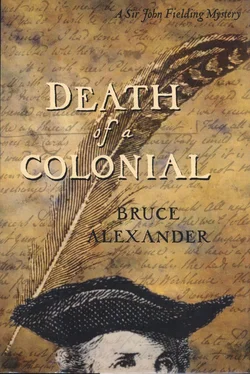Bruce Alexander - Death of a Colonial
Здесь есть возможность читать онлайн «Bruce Alexander - Death of a Colonial» весь текст электронной книги совершенно бесплатно (целиком полную версию без сокращений). В некоторых случаях можно слушать аудио, скачать через торрент в формате fb2 и присутствует краткое содержание. Год выпуска: 1999, ISBN: 1999, Издательство: Putnam Adult, Жанр: Исторический детектив, на английском языке. Описание произведения, (предисловие) а так же отзывы посетителей доступны на портале библиотеки ЛибКат.
- Название:Death of a Colonial
- Автор:
- Издательство:Putnam Adult
- Жанр:
- Год:1999
- ISBN:9780425177020
- Рейтинг книги:3 / 5. Голосов: 1
-
Избранное:Добавить в избранное
- Отзывы:
-
Ваша оценка:
- 60
- 1
- 2
- 3
- 4
- 5
Death of a Colonial: краткое содержание, описание и аннотация
Предлагаем к чтению аннотацию, описание, краткое содержание или предисловие (зависит от того, что написал сам автор книги «Death of a Colonial»). Если вы не нашли необходимую информацию о книге — напишите в комментариях, мы постараемся отыскать её.
Death of a Colonial — читать онлайн бесплатно полную книгу (весь текст) целиком
Ниже представлен текст книги, разбитый по страницам. Система сохранения места последней прочитанной страницы, позволяет с удобством читать онлайн бесплатно книгу «Death of a Colonial», без необходимости каждый раз заново искать на чём Вы остановились. Поставьте закладку, и сможете в любой момент перейти на страницу, на которой закончили чтение.
Интервал:
Закладка:
Mr. Mobley: “Would you say that the condition of the body was consistent with my description of our struggle in the room?”
Mr. Donnelly: “I would say it was completely consistent.”
With that, Mr. Mobley thanked him and said he had no more questions. And the counsel for the prosecution declined the opportunity to cross-examine. However, as Mr. Donnelly was preparing to step down, the Lord Chief Justice asked him to remain, for he had a question or two for him.
“Mr. Donnelly,” said the judge, “in your description of the corpus of Eli Bolt, if that be his name, you described his wounds and bruises, et cetera, quite well, but you did not tell us one thing that may loom as important in the minds of the jurors. Was the deceased a small man or a big man?’’
“He was a very big man, my lord,” said Mr. Donnelly. “It might be no exaggeration to say that he was huge.”
“Larger than Mr. Mobley?”
Mr. Donnelly cast a look at Mobley. “Not quite so tall, but near two stone heavier — and quite muscular in his general physique.”
The Lord Chief Justice then dismissed him with thanks and invited Mr. Mobley to call his second witness. That was done quickly enough, as the prisoner summoned Sir John Fielding. He appeared so quickly that I suspected he had been listening at the door to the courtroom. He was helped by a bailiff, who guided him to the witness stand by holding him at the elbow; Sir John disliked that manner of conveyance, as I well knew, yet he submitted to it with noble forbearance.
“Why, this is indeed a surprise, Sir John,” said Lord Mansfield. “I cannot recall you ever before appearing as a witness. Do you do so willingly? “
“Most willingly, my lord. I believe I have something of some importance to contribute.”
“Quite interesting. You may proceed with your defense, Mr. Mobley.”
Sir John had come for one purpose and one purpose only: to acquaint the jury with the supposed suicide eight years past of Herbert Mudge in the same hotel. He suggested it certainly might have been murder; in fact, he had felt at the time it must have been, yet he could neither prove murder from physical evidence, nor from his repeated interrogations of the man he held most suspect, Mr. Mudge’s traveling companion, Elijah Elison. He invited all to note the similarity of that name to Elijah Bolton and Eli Bolt. “These are, as I have discovered,” said Sir John, “but three names for the same man. I know not which indeed was the correct name. Perhaps none of them was. I have settled upon Eli Bolt because that is how he was identified to me by one who knew him years ago in the colonies. It was also how Mr. Mobley came to know him first in the colony of Maryland. The name Elijah Bolton, which he bore at the time of his death, was simply an invention to carry him safe, perhaps past my notice, in and around England.”
Then, at some length, he compared the “suicide” of Herbert Mudge with what had evidently been planned for Percival Mobley. He noted that in both instances a woven leather rope was used; that on the more recent occasion Eli Bolt had entered the room illegally and secretly, as eight years before he must have done. On and on Sir John did go, drawing parallels, making comparisons, and concluding: “Finally, there is good reason to believe that eight years ago, Sir Patrick Spenser was involved with Eli Bolt in a manner similar to his recent relation. Ah, but there perhaps I go too far, for while I accept the role he played in the false claim for the Laningham title, I can only speculate on the part he may have played eight years earlier.” Mr. Mobley, who had aided Sir John in his testimony by prompting with questions each time the magistrate showed any signs of slowing down, said that he had but one more question to put to him. “Oh? And what is that?” asked Sir John, seeming a bit surprised. “Do you accept as truthful what I put forward in my statement?”
“By and large, I do, yes. Certainly, I accept your account of the death of the man we shall call Eli Bolt — and it is for that you have come to be tried in this court.”
“Dare I ask what it is you reject?”
“I reject none of it, though I am less eager to accept your picture of yourself as a completely unwilling participant in the Laningham conspiracy. But as I say, it is not for that you are here today. No law was broken.”
Percival Mobley stood awkwardly before the court, clearly wishing to justify himself, yet knowing he had not the opportunity to do so. For near a minute he seemed on the verge of saying something pertinent. But, at last, all that came out was this: “That is all, Sir John. You may step down. And, my lord, that concludes my testimony.”
The final argument of the prosecution, indifferently stated as it was, is not worth noting here; nor, for that matter, is the last word from Mr. Mobley. Nevertheless, in his summing-up, Lord Mansfield took an approach which was for him eccentric — indeed, one might even say, unique — for he was, as every Londoner with criminal propensities knew, a “hanging judge”; he seemed almost to take pleasure in assigning the death penalty. On this occasion, however, the Lord Chief Justice put forth what amounted to a plea for mercy, yet it was framed in terms perfectly logical and perfectly legal.
He called the jury’s attention to the last words of the statement presented in court by the prisoner. (I quoted them near verbatim from Mr. Mobley.) “It was not my intention to kill Mr. Bolt. I wished only to end his attempt to kill me” Thus he read it out to the jurors. Then did he comment upon it as follows:
“Such an assertion as this would ordinarily constitute a plea for a finding of manslaughter — that is, death unintended. Yet it strikes me, having read and now heard the prisoner’s statement and heard the testimony of his distinguished witnesses, that we have the opportunity here to go even further. First of all, it cannot be murder, for Mr. Mobley was not the aggressor. Bolt, the deceased, lay in wait for him. He had no other reason to be in the room but to do harm to Mobley. When his first attempt failed, he did persist in his attempt not merely to do grievous bodily harm to the prisoner but to kill him. Yet he failed in that, too, because, though Mr. Mobley did not intend it so, he killed his adversary.
“It is very seldom that a true finding of ‘killing, no murder, by reason of self-defense’ can be justified. Alas, all too often the aggressor will press his advantage and kill his victim before the victim has a chance to defend himself. In this instance, that did not happen. Though the two, aggressor and victim, were fairly well matched in size, the victim fought back and saved himself. Perhaps it was that a man fights harder when he realizes, as Mr. Mobley did, that he was fighting for his life. And so he saved his life, though not without sustaining injuries of his own. You saw him limp to the dock. You see the bandage wrapped Mussulman-style about his head, the plaster on his ear and jaw. Eli Bolt, if that be his name, was a powerful adversary-yet he, and not the prisoner, died in the struggle. And what did Mr. Mobley do when he saw that he had killed the man who attacked him? He went straightaway to the Bow Street Court, seeking the magistrate, to surrender himself and make a statement, because in his mind and in his heart he knew that he had not committed murder but only defended himself. I tend to believe that this is one of those rare occasions when a finding of self-defense is justified. Yet I respect you, the members of the jury, far too much to direct you to find according to my belief. I send you off to your deliberations confident that you will find your way there on your own.”
And so the jury went off to deliberate, and I turned to young Archibald Talley to discuss this singular case. I found him in the process of taking his leave of the court.
Читать дальшеИнтервал:
Закладка:
Похожие книги на «Death of a Colonial»
Представляем Вашему вниманию похожие книги на «Death of a Colonial» списком для выбора. Мы отобрали схожую по названию и смыслу литературу в надежде предоставить читателям больше вариантов отыскать новые, интересные, ещё непрочитанные произведения.
Обсуждение, отзывы о книге «Death of a Colonial» и просто собственные мнения читателей. Оставьте ваши комментарии, напишите, что Вы думаете о произведении, его смысле или главных героях. Укажите что конкретно понравилось, а что нет, и почему Вы так считаете.












